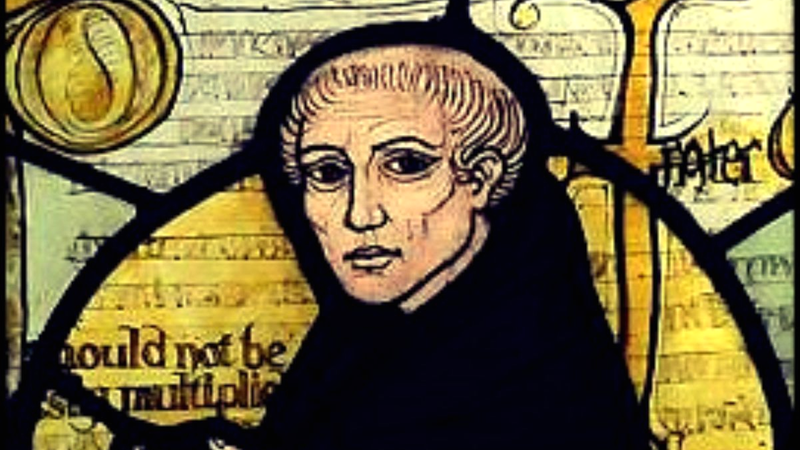

From Duns Scotus, William of Ockham derived his view of divine omnipotence, his view of grace and justification, much of his epistemology and ethical convictions. William incorporated much of the work of some previous theologians, especially Duns Scotus. In scholasticism, William of Ockham advocated reform in both method and content, the aim of which was simplification. William of Ockham died (prior to the outbreak of the plague) on 9 April 1347.

After Michael of Cesena's death in 1342, William became the leader of the small band of Franciscan dissidents living in exile with Louis IV. He spent much of the remainder of his life writing about political issues, including the relative authority and rights of the spiritual and temporal powers. William of Ockham's philosophy was never officially condemned as heretical. "On June 6, 1328, William was officially excommunicated for leaving Avignon without permission," and William argued that John XXII was a heretic for attacking the doctrine of Apostolic poverty and the Rule of Saint Francis, which had been endorsed by previous popes. In return for protection and patronage William wrote treatises that argued for Emperor Louis to have supreme control over church and state in the Holy Roman Empire. After studying the works of John XXII and previous papal statements, William agreed with the Minister General. This brought them into conflict with Pope John XXII.īecause of the pope's attack on the Rule of Saint Francis, William of Ockham, Michael of Cesena and other leading Franciscans fled Avignon on, and eventually took refuge in the court of the Holy Roman Emperor Louis IV of Bavaria, who was also engaged in dispute with the papacy, and became William's patron. The Franciscans believed that Jesus and his apostles owned no property either individually or in common, and the Rule of Saint Francis commanded members of the order to follow this practice. Michael of Cesena had asked William to review arguments surrounding Apostolic poverty. A theological commission had been asked to review his Commentary on the Sentences, and it was during this that William of Ockham found himself involved in a different debate. The Franciscan Minister General, Michael of Cesena, had been summoned to Avignon, to answer charges of heresy. It is generally believed that these charges were levied by Oxford chancellor John Lutterell. Īn alternative understanding, recently proposed by George Knysh, suggests that he was initially appointed in Avignon as a professor of philosophy in the Franciscan school, and that his disciplinary difficulties did not begin until 1327.

In 1324, his commentary was condemned as unorthodox by a synod of bishops, and he was ordered to Avignon, France, to defend himself before a papal court. However, William's commentary was not well received by his colleagues, or by the Church authorities. William of Ockham was among these scholarly commentators. ĭuring the Middle Ages, theologian Peter Lombard's Sentences (1150) had become a standard work of theology, and many ambitious theological scholars wrote commentaries on it. Because of this, he acquired the honorific title Venerabilis Inceptor, or "Venerable Beginner" (an inceptor was a student formally admitted to the ranks of teachers by the university authorities). It is believed that he then studied theology at the University of Oxford from 1309 to 1321, but while he completed all the requirements for a master's degree in theology, he was never made a regent master.

He received his elementary education in the London House of the Greyfriars. William of Ockham was born in Ockham, Surrey in 1287.


 0 kommentar(er)
0 kommentar(er)
